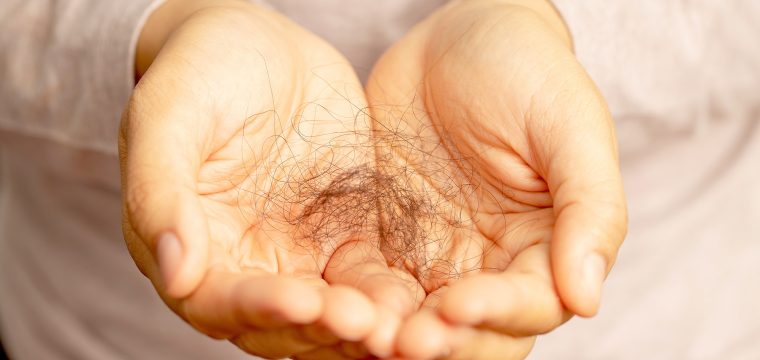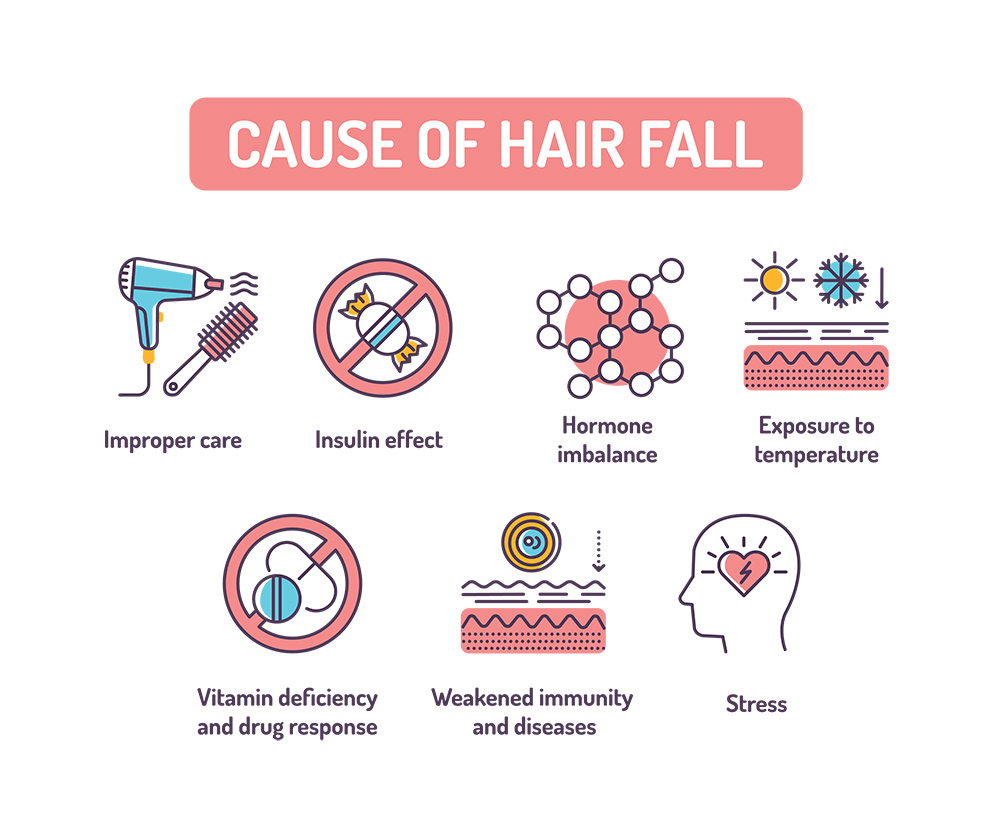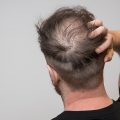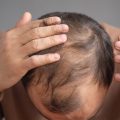
What’s Causing My Hair to Fall Out?
Last updated on September 9, 2025
You’re brushing your hair in the morning and notice more strands than usual in the bristles. Later, you run your hand through your hair and find a few more on your palm. It’s enough to make anyone pause and ask the question: why is my hair falling out?
For men and women alike, losing hair can feel worrying, but the truth is that not all shedding means something is wrong. Hair has its own rhythm of growing, resting, and falling, and sometimes that rhythm gets disrupted. Knowing the difference between normal shedding and a deeper issue can save you a lot of stress, and help you decide what to do next.
How Much Hair Loss is Normal?
Everyone sheds hair, and it’s a completely natural part of the hair growth cycle. On average, how many strands of hair fall out a day ranges from 50 to 100. You’ll notice them in the shower, on your pillow, or caught in your hairbrush. That’s simply old hairs making way for new ones.
The red flag comes when the amount goes beyond the usual. If you’re finding handfuls in the shower drain, bald spots appearing, or your part looking wider, then it’s time to pay attention.
The Most Common Causes of Hair Fall
Hair loss doesn’t have one single cause. It can be influenced by your genes, health, lifestyle, and even how you care for your hair. Here are some of the most common reasons men and women notice more shedding than usual:
1. Genetics
Hereditary hair loss, also known as androgenetic alopecia, is the number one cause of thinning hair. In men, it often begins with a receding hairline or thinning on the crown. Women tend to notice overall thinning, especially along the part. Genes make some follicles more sensitive to certain hormones, which can shorten the growth cycle and shrink hair follicles over time.
2. Hormonal Shifts
Pregnancy, childbirth, menopause, and conditions like PCOS can all trigger hormonal changes that affect hair growth. Men can also experience thinning if hormone levels shift. These changes often tip more hairs into the shedding phase, making hair loss more noticeable.
3. Stress and Lifestyle
Major life events, illness, or even long periods of poor sleep and high stress can shock the hair cycle into a shedding phase called telogen effluvium. This kind of loss often comes on suddenly but may resolve once the stress passes.
4. Nutrition
Hair relies on nutrients like iron, zinc, vitamin D, and protein. Diets low in these essential vitamins and nutrients can leave hair weak and prone to falling out. Crash diets or long-term restrictive eating plans are common culprits.
5. Medical Conditions and Medications
Thyroid disorders, autoimmune conditions, and certain medications can all list hair loss as a side effect. If you’ve started a new medication and notice more shedding, it’s worth checking in with your doctor.
6. Hair Care Practices
Frequent bleaching, heat styling, or tight hairstyles don’t just damage the hair shaft; they can weaken follicles over time. While this type of breakage looks different from follicle-related loss, the end result is still thinner-looking hair.

At Hair Transplants Melbourne, we offer tailored treatments for men and women to help stop your hair falling out, from advanced medical therapies to FUT and FUE transplant procedures. With flexible payment plans available, restoring your hair is more accessible than ever.
When to Take Hair Loss Seriously
Not every extra strand is a cause for panic, but some signs do warrant closer attention:
- Sudden or rapid thinning in patches
- A widening part or receding hairline
- Unusual amounts of hair left behind after brushing or washing
- Hair loss paired with fatigue, weight changes, or other health concerns
The sooner you seek advice, the easier it is to identify what’s happening and explore solutions.
How to Stop My Hair Falling Out
There isn’t a single answer, but there are steps you can take to protect your hair and reduce further loss.
Focus on Nutrition
Fill your meals with protein-rich foods, leafy greens, whole grains, and healthy fats. Iron, zinc, vitamin D, and B vitamins are especially important for hair health.
Manage Stress
Stress plays a surprisingly big role in hair cycles. Regular exercise, proper sleep, and activities that help you unwind can all reduce stress-related shedding.
Care for Your Hair Gently
Skip harsh treatments like peroxides and dyes where you can. Use gentle shampoos, reduce heat styling, and avoid hairstyles that pull tightly on the scalp.
Medical Check-ups
If you’re still unsure about what’s happening, a medical check can rule out underlying health conditions. Doctors can also help you identify whether your loss is temporary or progressive.
Non-Surgical Treatments
Men and women with early-stage hair loss can benefit from non-surgical medical treatments designed to stimulate growth and strengthen follicles. Growth factor treatments, exosomes treatments, and other advanced procedures are available through hair restoration clinics.
Why Men and Women Notice Different Patterns
Although the causes of hair fall overlap, the way it shows up often differs between genders. Men tend to experience a receding hairline or bald patches, while women usually notice a gradual thinning across the scalp. Women may also see temporary shedding linked to pregnancy or menopause. These differences mean treatment is often tailored to each person’s specific pattern.
Taking Back Control
If you’ve been wondering why is my hair falling out more than usual?, the best step you can take is to start paying attention early. Track how much you’re shedding, look at your diet and lifestyle, and reach out for professional guidance if the loss continues. Acting early makes a big difference, whether the cause is temporary or long-term.
Effective Medical Hair Loss Solutions are Here to Help
Hair loss is rarely simple, but it is manageable. Understanding the causes of hair fall and the signs that something is wrong gives you a clearer path forward. At Hair Transplants Melbourne, we help men and women explore the right solutions, whether that’s advanced medical hair growth therapies, supportive treatments, or hair transplant procedures, complete with affordable payment plans. If you’re searching for answers on how to stop your hair falling out, booking a consultation is the first step to finding a plan that works for you.
FAQs
Can hair loss be reversed?
In many cases, yes. Hair loss caused by stress, diet, or hormonal shifts can often be improved with the right care and treatment. Genetic hair loss requires more advanced approaches, such as FUE hair transplants or FUT hair transplants, or supportive therapies like exosomes or Liquid Hair Therapy. At Hair Transplants Melbourne, we’ve helped men and women restore natural growth with personalised plans. Get a free quote online now or book a consultation to explore solutions.
Are hair transplants permanent?
Yes, hair transplants such as FUE and FUT provide permanent results because donor follicles are resistant to the hormones that cause thinning. Once implanted, these hairs continue to grow naturally. At Hair Transplants Melbourne, our doctors are highly experienced in creating natural results tailored to each patient. We also provide supportive therapies to enhance transplant outcomes. You can explore our transparent pricing and payment plans, then book a hair loss consultation or request a free online quote.
Which hair loss treatment is right for me?
The right treatment depends on the type and stage of your hair loss. For early thinning, non-surgical options like growth factor therapy or Liquid Hair Therapy may be effective. For more advanced loss, FUE or FUT hair transplants are often the best solution. At Hair Transplants Melbourne, our doctors provide personalised advice based on your needs. Book a consultation or get a free online quote to discuss options, pricing, and flexible payment plans.
What results can I expect from medical hair loss treatments?
Results vary depending on the treatment and severity of hair loss, but most patients notice visible improvement in density and growth within a few months. Transplants provide permanent results, while supportive therapies can strengthen follicles and slow further loss. At Hair Transplants Melbourne, our patients receive tailored plans, professional care, and proven results. We encourage you to book a consultation or request a free online quote to see what outcome you can expect.
Can I get payment plans for hair transplants or hair loss treatments?
Yes, we understand that hair restoration is an important investment. Our clinic in Melbourne offers flexible and affordable payment plans, as well as the option to access superannuation in some cases. This ensures treatments such as FUE and FUT transplants, or supportive therapies, are within reach for more people. You can explore our pricing online, request a free quote, or book a consultation with our team to learn more about your payment options.










